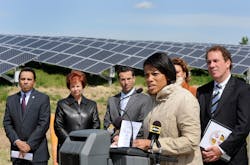Baltimore Energizes City With Solar Installation at Back River Wastewater Treatment Plant
A recently completed solar installation at the Back River Wastewater Treatment Plant is expected to save the city of Baltimore more than $6 million over the life of the project. During its construction phase, the project further supported the local economy through the addition of 75 jobs.
As part of a performance contract with Johnson Controls, a global provider of solutions that increase energy efficiency in buildings, the installation is helping the city reach its goal of self-generating 30% of its own electricity. The project also aligns with the EmPOWER Maryland initiative led by Gov. Martin O’Malley and the city of Baltimore’s sustainability goals.
A one-megawatt solar photovoltaic (PV) system was installed at a field located within the Back River Wastewater Treatment Plant, a facility of the city’s Department of Public Works. Subsidized in part by a $900,000 Maryland Energy Administration Project Sunburst grant, the PV system is capable of generating 1,000 kilowatts of electricity per hour. Producing clean electricity at a low cost for the city frees valuable budget dollars that can be allocated to other initiatives.
“The addition of solar energy to our ever growing arsenal of energy efficiency initiatives marks another step in the growth of Baltimore,” said Mayor Stephanie Rawlings-Blake. “This means that when the sun shines its brightest, Baltimore is at its best, creating clean, renewable energy for a healthier environment.”
This solar installation is expected to reduce carbon dioxide emissions by more than 9,500 metric tons annually – equivalent to planting 245,500 trees and removing nearly 1,800 passenger vehicles from the road.
“Mayor Rawlings-Blake’s commitment to creating a sustainable environment through energy efficiency and renewable resources should be replicated in every city,” said Arif Quraishi, vice president, Sales and Marketing, Energy Solutions Americas, Johnson Controls. “The impact of these efforts will reach far beyond the residents of Baltimore and take us a step closer to global clean energy.”
Building on a 20-year history of working together, Johnson Controls has implemented other energy-saving projects for the city of Baltimore, including enhancements to City Hall, courthouses, fire stations and office buildings, along with the implementation of a cogeneration facility, a power plant, at Back River Waste Water Treatment Plant. These projects are expected to save Baltimore an estimated $60.8 million in energy and operational costs over a 15-year performance contract.
Source: Baltimore City Department of General Services/ Johnson Controls
